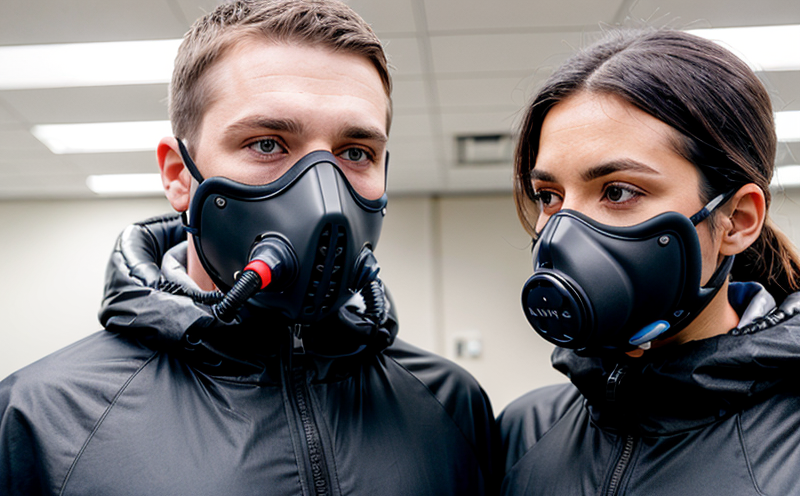ISO 16972 Breathing Resistance Testing
The ISO 16972 standard is a crucial benchmark in respiratory protection testing, ensuring that respirators and other devices used to filter or modify breathing air meet the highest safety and performance standards. This service involves assessing the breathing resistance of respirators under controlled laboratory conditions, which are critical for occupational health and safety.
Respiratory protection is essential in various sectors where workers may be exposed to harmful airborne contaminants such as dust, fumes, gases, or vapors. The standard provides a methodical approach to measuring the breathing resistance of respirators, ensuring that they function effectively without causing undue discomfort to the wearer.
The testing process involves simulating different types of usage scenarios, including continuous wear, intermittent use, and various environmental conditions. This ensures that the respirator can withstand real-world conditions while maintaining its protective capabilities. The test setup typically includes a breathing simulator with adjustable air flow rates and pressures to mimic the breathing patterns of an average adult.
Before testing begins, it is essential to properly prepare the respirators according to the manufacturer's specifications. This may include cleaning, conditioning, or calibrating the device. The test specimen must be in optimal condition to ensure accurate results. During the test, a pressure differential between the inside and outside of the respirator is measured as air flows through it.
The ISO 16972 standard defines specific criteria for acceptable breathing resistance levels based on the type of respirator being tested. For instance, half-mask respirators are required to have a lower breathing resistance compared to full-facepiece respirators due to their design and intended use. The testing apparatus measures this differential pressure in millimeters of water (mmH2O) as air passes through the respirator.
The results of these tests are critical for manufacturers, distributors, and end-users alike. They ensure that respirators meet stringent safety standards before being marketed or used in occupational environments. The testing process not only verifies compliance with international standards but also helps identify any potential design flaws or performance issues early on in the product lifecycle.
Understanding the real-world implications of these tests is key to appreciating their importance. For instance, a respirator that fails the breathing resistance test might cause discomfort for the wearer, leading them to remove it during critical tasks. This not only reduces protection but could also lead to increased exposure to hazardous substances. Conversely, a respirator that passes this test can provide peace of mind and confidence in its effectiveness.
It is important to note that ISO 16972 applies to both new products entering the market and existing ones being revised or re-certified. This ongoing compliance ensures that safety standards remain current and relevant, adapting to evolving workplace hazards and regulations.
- International Acceptance and Recognition: The ISO 16972 standard is widely recognized globally for its stringent requirements on breathing resistance testing. It has been adopted by numerous countries as a national standard or recommended practice, ensuring consistent quality across diverse markets.
- Environmental and Sustainability Contributions: By promoting the use of respirators that meet high respiratory resistance standards, this service indirectly supports environmental sustainability goals. Cleaner air within workplaces reduces the need for more extensive ventilation systems, leading to energy savings and reduced carbon footprints.
Customer Impact and Satisfaction
Our respiratory protection testing service plays a pivotal role in enhancing customer satisfaction by ensuring that the respirators they choose meet or exceed international safety standards. This not only protects their employees but also builds trust with clients, regulators, and stakeholders.
For quality managers and compliance officers, passing ISO 16972 tests demonstrates commitment to occupational health and safety. It can lead to reduced insurance premiums, lower worker compensation claims, and a positive reputation in the industry. For R&D engineers, this service provides valuable feedback on product design improvements.
For procurement teams, ensuring compliance with ISO 16972 helps avoid costly recalls or product withdrawals. They can confidently select suppliers who adhere to these rigorous testing procedures, thereby improving overall supply chain reliability and performance.
The detailed reports generated from our tests offer insights into potential areas for improvement, guiding continuous enhancement of respiratory protection devices. This proactive approach ensures that products remain competitive in a rapidly changing regulatory landscape.





